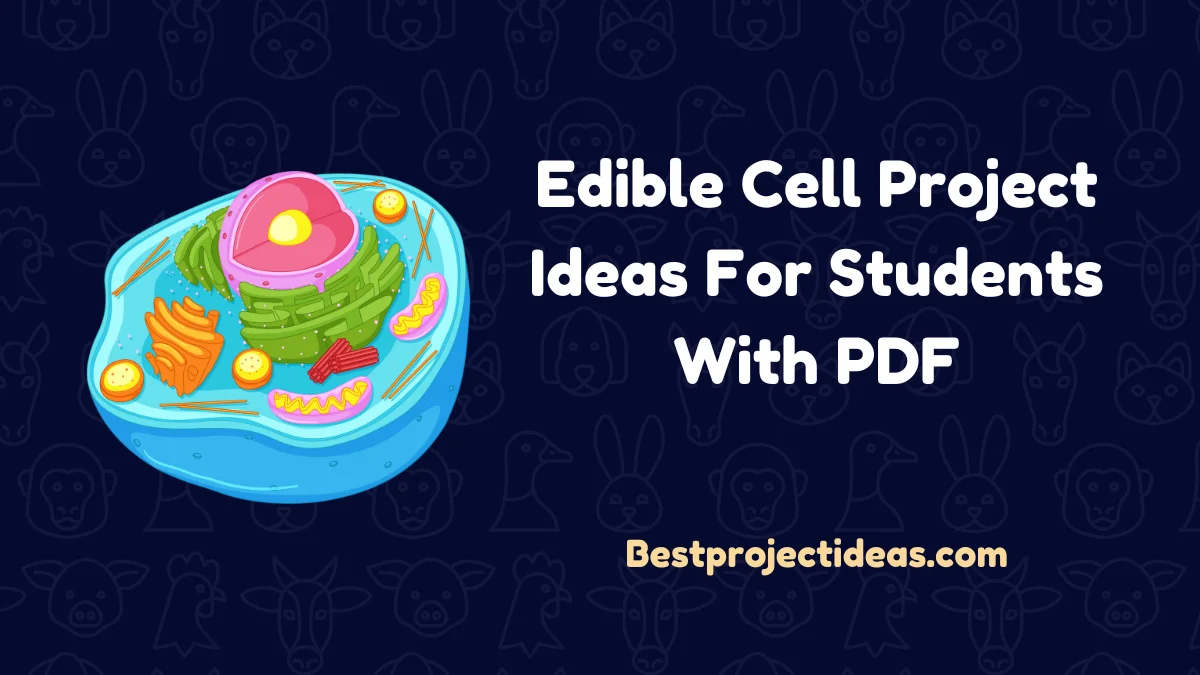
Edible Cell Project Ideas are a fun and tasty way for kids to learn about biology. Imagine making a cell you can eat! These projects let children use their creativity while learning important science ideas.
By making cells out of candy, fruits, or other yummy treats, kids can better understand the parts of a cell and how they work together. It’s like building a tasty 3D model right in the classroom. This hands-on way makes learning about cells more fun and memorable.
Who doesn’t love a project that ends with a yummy snack? Get ready to explore the world of cells in the yummiest way possible!
Also Read: Top 299+ Research Topics in Psychology 2024
What Are Edible Plant Cell Ingredients?
Common Edible Plant Cell Components
1. Cellulose
Found in: Cell walls of fruits, vegetables, grains
Used as: Dietary fiber, food thickener (E460)
Benefits: Helps with digestion, makes you feel full
2. Pectin
Found in: Cell walls of fruits (like apples, citrus)
Used as: Gelling agent in jams, jellies
Benefits: Natural thickener, keeps food fresh longer
3. Starch
Found in: Storage parts in potatoes, corn, rice
Used as a thickener, stabilizer
Benefits: Gives energy, adds texture
4. Plant Proteins
Found in: All over plant cells
Examples: Pea protein, soy protein, wheat gluten
Benefits: Source of protein, adds texture
5. Plant Oils
Found in: Cell membranes and storage parts
Examples: Olive oil, coconut oil, sunflower oil
Benefits: Adds flavor nutrients, used for cooking
Edible Cell Project Ideas For Students
Here are the top Edible Cell Project Ideas For Students in 2024/2025:
Sweet Treats Category
- Jelly bean nucleus inside chocolate cookie cell
- Marshmallow cell with gummy bear parts inside
- Donut base featuring candy organelles throughout
- Ice cream sandwich cell with sprinkled ribosomes
- Cookie dough cell with chocolate chip parts
- Cupcake cell containing fruit roll membrane
- Rice crispy treat base with candy decorations
- Sugar cookie platform with frosting cell parts
- Brownie square holding colorful candy pieces inside
- Pound cake slice with jelly organelle shapes
- Chocolate bark base containing dried fruit parts
- Fudge square decorated as cell components
- The vanilla wafer holding sweet cell structures
- Graham cracker base with marshmallow pieces
- Cotton candy surrounding gummy cell parts
- Meringue cookies displaying painted sugar designs
- Toffee square containing nutty cell features
- Shortbread cookie showing detailed cell layout
- Peanut butter cup filled with candy bits
- Caramel square decorated as cell structure
- White chocolate disk with colorful additions
- Lollipop flat surface containing cell details
- Rock candy base showing organelle shapes
- Maple candy square with nut cell parts
- Butterscotch disk featuring candy components
Fruit-Based Models
- Apple slice base showing raisin organelles
- Watermelon circle containing fruit bit parts
- Orange segments are arranged as cell structure
- Grape clusters forming cell components inside
- Banana slice platform with berry details
- Kiwi round displaying seed cell parts
- Pear-shaped cell with dried fruit
- Pineapple ring showing tropical fruit pieces
- Mango slice featuring coconut cell details
- Strawberry halves containing fruit arrangements inside
- Peach circle with raspberry cell features
- The plum half shows detailed fruit parts
- Cantaloupe circle containing melon ball organelles
- The piece displaying seed structures clearly
- Pomegranate half with natural cell details
- Papaya slice featuring small fruit pieces
- Blackberry cluster showing cell components naturally
- Cherry arrangement demonstrating cell structure
- Blueberry group forming organized cell parts
- Apricot half containing dried fruit details
- Tangerine circle with citrus segment features
- Honeydew slice showing melon piece structures
- Cranberry arrangement displaying cell organization
- Lemon round featuring citrus cell details
- The lime circle containing fruit segment parts
Bread & Pastry Models
- Bagel base showing seed cell features
- Pizza dough circle with topping organelles
- The croissant layer contains detailed parts inside
- Muffin top displaying organized cell structure
- Bread slices featuring colorful food additions
- Cinnamon roll spiral showing cell details
- Pretzel shape containing organized components
- Danish pastry displaying detailed cell parts
- Biscuit round with ingredient cell features
- English muffin showing a textured cell structure
- Pita bread pocket containing visible parts
- Scone triangle featuring detailed organization
- Brioche bun displaying cell components clearly
- Focaccia square with topping cell details
- Cornbread pieces showing organized structures
- Breadstick base containing visible features
- Waffle square displaying detailed cell parts
- Pancake circle with ingredient organelles
- Crepe thin, showing a layered cell structure
- Tortilla round featuring organized components
- Naan bread displaying detailed cell features
- Sourdough slice containing visible parts
- Challah braid showing intricate cell details
- Dinner roll featuring organized structures
- Flatbread base with clear cell components
Vegetable-Based Designs
- Cucumber slice showing seed cell structure
- Carrot round containing colorful organelles inside
- Bell pepper ring displaying vegetable parts
- Celery stick base with detailed features
- Radish slice showing organized cell components
- Zucchini round containing visible structures
- Eggplant circle featuring purple cell details
- Potato slice displaying starch cell parts
- Tomato round showing seed arrangements clearly
- A mushroom cap containing organized features
- Broccoli floret displaying natural cell structure
- Cauliflower piece showing white cell components
- Asparagus tip featuring detailed cell parts
- Brussels sprout layers containing visible details
- Cabbage leaf showing organized structures
- Artichoke heart displaying cell features clearly
- Green bean slice containing detailed parts
- Beet round showing a colorful cell structure
- Sweet potato circle featuring organized details
- Turnip slice displaying root cell components
- Parsnip round containing visible structures
- The onion layer shows cell organization clearly
- Leek slice featuring detailed cell parts
- Rutabaga’s piece displays organized components
- Kohlrabi round showing structured cell details
Snack Food Models
- Cheese cracker base with pretzel organelles
- Popcorn cluster showing detailed cell parts
- Trail mix arranged in cell structure
- Potato chip circle containing snack details
- Corn chip base displaying organized features
- Granola bar showing structured cell components
- Nut cluster containing visible cell parts
- Dried fruit arranged in a detailed structure
- Cereal piece featuring organized cell details
- Cracker round showing component arrangements clearly
- Snack mix displaying detailed cell features
- Cheese puff containing visible structures
- Pretzels arranged to show cell organization
- Tortilla chip base featuring clear parts
- Popped rice square displaying cell details
- Mixed nuts showing organized components
- Veggie chips containing structured features
- Dried seaweed displaying cell arrangements
- Cheese ball showing detailed structures
- Corn kernel cluster featuring cell parts
- Sunflower seed group containing organized details
- Rice cake displaying structured components
- Wheat thin showing clear cell features
- Goldfish cracker containing visible parts
- Granola cluster featuring organized structure
Dairy-Based Projects
- Cheese cube showing detailed cell parts
- Yogurt surface containing colorful organelles
- Cottage cheese displays structured components
- Cream cheese base featuring organized details
- String cheese showing a layered cell structure
- Butter pat containing visible cell parts
- Ricotta cheese displays organized features
- Mozzarella ball showing clear cell details
- The sour cream surface contains structured parts
- Whipped cream displaying detailed components
- Pudding cup showing organized cell features
- Ice cream scoop containing visible structures
- Frozen yogurt displaying cell arrangements
- Milkshake top showing detailed parts
- Gelato surface featuring organized components
- Custard cup containing structured details
- Hard cheese slice showing cell features
- Soft cheese round displaying visible parts
- Whey protein base containing cell structures
- Greek yogurt shows organized components
- Kefir surface featuring detailed parts
- Cheese spread displaying structured features
- Dairy dip shows clear cell organization
- Cream top containing visible structures
- Cheese sauce displays detailed components
Protein-Based Models
- Tofu cube showing organized cell parts
- Bean circle containing structured components
- Nut butter surface displaying detailed features
- Chickpea round showing a clear cell structure
- Lentil cluster containing visible organelles
- Egg white displaying organized components
- Seitan piece showing detailed cell parts
- Tempeh Square features structured details
- Hummus surface containing clear features
- Black bean paste showing cell organization
- Falafel ball displaying visible structures
- Quinoa cluster containing organized parts
- Split pea showing detailed components
- Soy protein featuring cell arrangements
- Peanut paste displaying structured details
- Almond butter shows clear features
- Edamame containing visible cell parts
- Lima bean displaying organized structure
- Navy bean showing detailed components
- Protein bar featuring cell arrangements
- Kidney beans containing structured parts
- Chickpea flour showing organized details
- Nut meal displaying clear features
- Protein powder containing cell structures
- Bean paste showing detailed components
International Food Designs
- Sushi roll showing organized cell parts
- Pasta circle containing structured components
- Dumpling skin displaying detailed features
- Couscous cluster showing clear organization
- Rice ball containing visible cell parts
- Noodle square featuring an organized structure
- Tortellini displays detailed components
- Pierogi showing clear cell arrangements
- Empanada containing structured details
- Samosa triangle featuring visible parts
- Spring roll showing organized features
- Miso soup with seaweed cell structure
- Mochi surface displaying cell organization
- Curry chunk featuring detailed parts
- Plantain circle showing structured components
- Baguette slice containing cell arrangements
- Taco shell featuring organized features
- Tamale surface displaying cell parts
- Falafel showing structured components
- Flatbread containing detailed arrangements
- Kebab displaying visible features
- Borscht surface containing cell details
- Pita showing organized cell components
- Gyro slice displaying structured parts
- Sushi bowl featuring visible cell structure
Grain-Based Models
- Rice showing detailed cell parts.
- Oatmeal with organized components.
- Barley cluster showing clear features.
- Corn meal with clear cell organization.
- Wheat berries display visible parts.
- Millet shows a detailed structure.
- Buckwheat with organized parts.
- Rye grain showing clear arrangements.
- Spelled containing structured details.
- Amaranth features visible cell parts.
- Sorghum shows organized features.
- Teff with clear components.
- Wild rice containing structured parts.
- Bulgur wheat with clear organization.
- Farro shows visible cell features.
- Kamut with organized structures.
- Triticale showing detailed components.
- Pearl barley with clear arrangements.
- Freekeh shows structured parts.
- Job’s tears feature visible details.
- Einkorn with organized components.
- Emmer shows clear cell structures.
- Durum with detailed features.
- Maize showing structured parts.
- Brown rice with clear organization.
Natural Sweet Models
- Honey shows detailed cell parts.
- Maple syrup with organized components.
- Date paste showing structured features.
- Fig spread with clear organization.
- Applesauce displaying visible cell parts.
- Agave with detailed structures.
- Molasses showing organized components.
- Fruit puree with clear arrangements.
- Berry Jam shows structured details.
- Coconut syrup featuring visible parts.
- Stevia leaf with organized features.
- Monk fruit showing detailed components.
- Yacon syrup with structured parts.
- Carob displays clear organization.
- Lucuma powder with visible features.
- Malt syrup containing organized structures.
- Fruit leather shows detailed components.
- Cane juice with clear arrangements.
- Sorghum syrup showing structured parts.
- Date sugar featuring visible details.
- Pomegranate molasses with organized components.
- Pear sauce shows clear structures.
- Banana paste with detailed features.
- Peach puree displaying structured parts.
- Apple butter with clear organization.
How Do You Make An Edible Model Of A Cell?
Edible Cell Model Components Guide
1. Base Structure
The base shows the cytoplasm and can be clear gelatin or a round cake. This part holds all other cell parts and shows the gel-like substance inside cells.
2. Cell Membrane
Use fruit roll-ups or fruit leather around the edges of your base. This flexible layer acts as the cell’s barrier, controlling what goes in and out.
3. Cell Wall (Plant Cells Only)
Use graham crackers around the membrane’s edge. This sturdy wall supports and protects like a plant cell’s wall.
4. Nucleus
Use a giant chocolate truffle or cake ball for this big cell part. The nucleus is the cell’s control center, so place it in the center of your model.
5. Endoplasmic Reticulum
Use red or pink twisted licorice ropes. The rough ER (with sprinkles) and smooth ER (plain) show the cell’s protein-making and transport system.
6. Golgi Body
Stack wafer cookies like Kit Kats in curved rows. This shows the cell’s packaging area where proteins are prepared and sent out.
7. Mitochondria
Place green or brown jelly beans around the model. These are the cell’s power plants where energy is made for cell work.
8. Chloroplasts (Plant Cells Only)
Use green gummy bears or lime fruit slices. These stand for the parts that do photosynthesis in plant cells.
9. Vacuole
Use a large gummy candy or gelatin ball in blue or clear colors. This shows the cell’s storage area for water and nutrients.
10. Lysosomes
Scatter small candies like Nerds or mini M&Ms around. These are the cell’s cleanup crew that breaks down waste.
What Materials Do You Need To Make A Plant Cell Model?
Materials for an Educational Plant Cell Model
1. Basic Materials Needed:
- Large shallow container or shoebox
- Clear plastic container
- Styrofoam block
2. Cell Parts Representation:
- Modeling clay (many colors)
- Foam balls
- Beads
- String or yarn
- Small balloons
- Pipe cleaners
- Construction paper
3. Decorative/Connective Materials:
- Clear gelatin (for cytoplasm)
- Hot glue gun & glue sticks
- Scissors
- Markers or paint
- Labels or toothpicks for naming parts
4. Suggested Materials for Specific Organelles:
- Cell Wall: Green construction paper or cardboard
- Cell Membrane: Clear plastic wrap
- Nucleus: Large foam ball or clay
- Chloroplasts: Small green foam pieces
- Vacuole: Clear balloon or plastic bag
- Mitochondria: Twisted pipe cleaners
- Endoplasmic Reticulum: Ribbon or string
- Golgi Body: Stacked foam pieces
- Ribosomes: Small beads
Must Read: 225 Best Out Of Waste Ideas For School Project For Students
Wrap Up
Learning about cells just got a lot more fun! The Edible Cell Project is a cool and fun way for students to learn about the different parts of a cell. By using common foods like Jell-O, fruits, and cookies, students can make a 3D model of a cell that is yummy and educational. This hands-on project helps students see and remember the cell’s shape and jobs, making it a great way to learn about biology. With some creativity, students can turn a tricky subject into a tasty treat that will make learning exciting!

